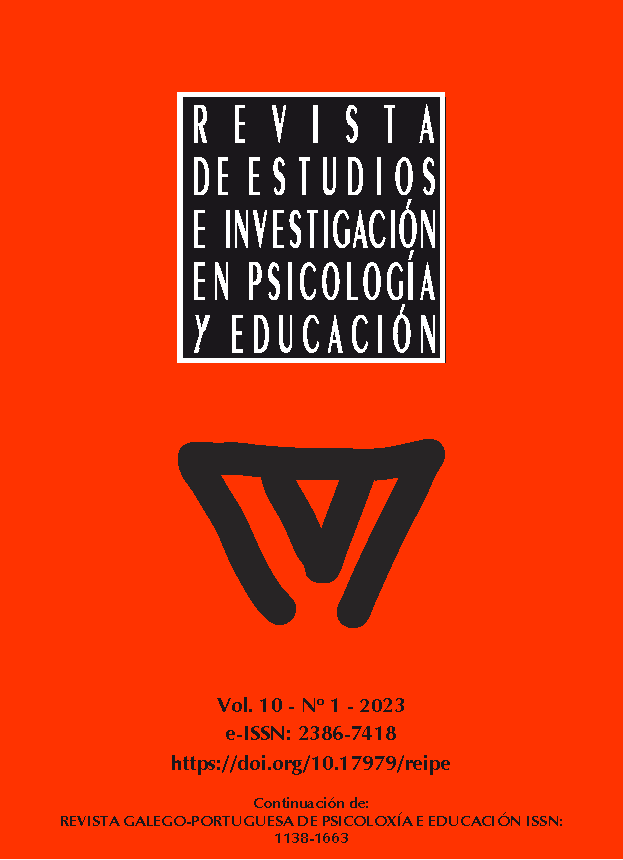Analysis processes for solving quantitative reasoning problems: A study of student responses
Main Article Content
Abstract
This work presents a descriptive, cross-sectional, qualitative study of the problem-solving procedures used by a group of first-year university students in response to a specific set of quantitative reasoning (QR) problems. The aim of the research is to analyze the students’ responses to the problems posed in order to assess their quantitative reasoning performance and determine if it matches the expected construct, according to which QR problems are associated with the analysis processes necessary for their resolution (namely, generalization, exemplification and validation). The sample for the study consisted of a group of 20 first-year university students (mean age 19.85 ± 0.81 years). The data were obtained from a single data collection from each subject in the form of a cognitive interview during the completion of a university admissions test comprising eight QR problems. Prior to testing, the problems were assessed by experts and associated with a series of analysis processes and procedures (analysis categories) necessary for their resolution. The think-aloud protocol analysis of the interviews revealed that the procedures associated with each analysis process coincided in most instances with the processes and procedures predicted by the experts. The findings of the study offer valuable insights for QR assessment test developers.
Keywords:
Downloads
Article Details
References
AERA (American Educational Research Association), APA (American Psychological Association) & NCME (National Council on Measurement in Education) (2014). Standards for educational and psychological testing. American Educational Research Association.
BRITO, Nancy (2014). La experiencia del aprendizaje mediado en el desarrollo de habilidades para el razonamiento matemático, verbal, abstracto y cuantitativo. Estudio de caso facultad de artes y facultad de ingeniería civil de la universidad de Cuenca [Tesis de Maestría, Universidad de Cuenca, Ecuador]. http://dspace.ucuenca.edu.ec/handle/123456789/23031
BRIZUELA, Armel; JIMENEZ, Karol; PÉREZ, Nelson; & ROJAS, Guaner (2016). Autorreportes verbales en voz alta para la identificación de procesos de razonamiento en pruebas estandarizadas. Revista Costarricense de Psicología, 35(1), 17-30. https://doi.org/10.22544/rcps.v35i01.02
CABASSUT, Richard (2005). Démonstration, raisonnement et validation dans l’enseignement secondaire des mathématiques en France et en Allemagne [Proof, reasoning and validation in mathematics secondary teaching in France and Germany] [Tesis doctoral, Université Paris Diderot, France]. https://tel.archives-ouvertes.fr/tel-00009716
CAÑADAS, María Consuelo; DEULOFEU, Jordi; FIGUEIRAS, Lourdes; REID, David; & YEVDOKIMOV, Oleksiy (2007). The conjecturing process: Perspectives in theory and implications in practice. Journal of Teaching and Learning, 5(1), 55–72. http://hdl.handle.net/10481/5521
DWYER, Carol; GALLAGHER, Ann; LEVIN, Jutta; & MORLEY, Mary (2003). What is Quantitative Reasoning? Defining the Construct for Assessment Purposes. Research Reports. Educational Testing Service. Princeton. http://doi.org/10.1002/j.2333-8504.2003.tb01922.x
ERICCSON, K. Anders; & SIMON. Herbert A. (1980). Verbal reports as data. Psychological Reports, 87(3), 215–250. https://doi.org/10.1037/0033-295X.87.3.215
JEANNOTTE, Doris; & KIERAN, Carolyn (2017). A conceptual model of mathematical reasoning for school mathematics. Educational Studies in Mathematics, 96, 1-16. https://doi.org/10.1007/s10649-017-9761-8
LITHNER, Johan (2008). A research framework for creative and imitative reasoning. Educational Studies in Mathematics, 67(3), 255–276. https://doi.org/10.1007/s10649-007-9104-2
MARRADES, Ramón; & GUTIÉRREZ, Ángel (2000). Proofs produced by secondary school students learning geometry in a dynamic computer environment. Educational Studies in Mathematics, 44, 87-125. https://www.jstor.org/stable/3483206
MASON, John (2001). Questions about mathematical reasoning and proof in schools. Opening address. QCA Conference, UK.
MAYES, Robert; PETERSON, Franziska; & BONILLA, Rachel (2013). Quantitative Reasoning Learning Progressions for Environmental Science: Development a Framework. Numeracy. 6 (4)1-28. https://doi.org/10.5038/1936-4660.6.1.4
MONTERO-ROJAS, Eiliana; MOREIRA-MORA, Tania; ZAMORA-ARAYA, José Andrey; & SMITH-CASTRO, Vanessa (2021). Una nueva mirada teórica y metodológica a diferencias de género en pruebas de matemática: Razonamiento, actitudes psicosociales y modelos multinivel. Educare, 25(1), 1-21. http://doi.org/10.15359/ree.25-1.8
MUZANI, Muhammad; JUNIATI, Dwi; & SISWONO, Eko (2018). Exploration of student’s quantitative reasoning in solving mathematical problem: case study of field-dependent cognitive style. Journal of Physics: Conference series, 1157(3), 1-6. http://doi.org/10.1088/1742-6596/1157/3/032093
PÓLYA, George (1968). Mathematics and plausible reasoning (2nd ed.). Princeton University Press.
RHODES, Terrel (2010). Assessing Outcomes and Improving Achievement: Tips and tools for Using Rubrics. Washington, DC: Association of American Colleges and Universities.
ROBERTS, Maxwell (2008). Heuristics and reasoning: Making deduction simple. En J.P., Leighton, & R.J., Sternberg (Eds.). The nature of reasoning (pp. 234-272). Cambridge University Press. https://doi.org/10.1017/CBO9780511818714
SEID, Gonzalo (2016). Procedimientos para el análisis cualitativo de entrevistas. Una propuesta didáctica. Actas del V Encuentro Latinoamericano de Metodología de las Ciencias Sociales. V ELMeCS. Mendoza, Argentina. https://repositoriosdigitales.mincyt.gob.ar/vufind/Record/MemAca_9c8b3bd31e0b9d5fa4e26bd71f70fc91
SMITH-CASTRO, Vanessa; & MOLINA, Mauricio (2011). La entrevista cognitiva: Guía para su aplicación en la evaluación y mejoramiento de instrumentos de papel y lápiz. Cuadernos metodológicos 5 (1), 1-114. Instituto de investigaciones Psicológicas, Universidad de Costa Rica. https://iip.ucr.ac.cr/es/publicaciones/publicacion-de-investigador/la-entrevista-cognitiva-guia-para-su-aplicacion-en-la-0
STYLIANIDES, Gabriel (2008). An analytic framework of reasoning-and-proving. For the Learning of Mathematics, 28(1), 9–16. https://www.jstor.org/stable/40248592
THOMPSON, Patrick (2010). Quantitative reasoning and mathematical modeling. En Scott A. Chamberlin, Larry L. Hatfield, & Shashidhar Belbase (Eds). New perspectives and directions for collaborative research in mathematics education. College of Education, University of Wyoming.
VÍQUEZ, Leiner; MORA, Mónica; ORDÓÑEZ, Graciela; & ROJAS, Luis (2021). Introducción a la prueba de habilidades cuantitativas. Editorial de la Universidad de Costa Rica.



